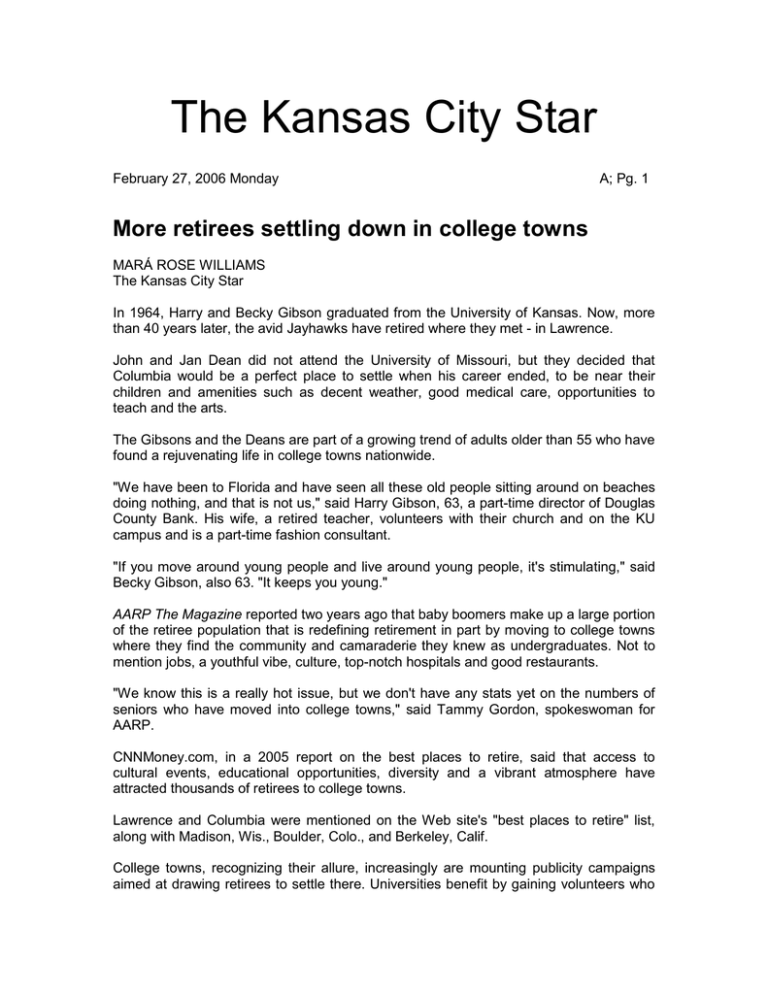The Kansas City Star More retirees settling down in college towns
advertisement

The Kansas City Star February 27, 2006 Monday A; Pg. 1 More retirees settling down in college towns MARÁ ROSE WILLIAMS The Kansas City Star In 1964, Harry and Becky Gibson graduated from the University of Kansas. Now, more than 40 years later, the avid Jayhawks have retired where they met - in Lawrence. John and Jan Dean did not attend the University of Missouri, but they decided that Columbia would be a perfect place to settle when his career ended, to be near their children and amenities such as decent weather, good medical care, opportunities to teach and the arts. The Gibsons and the Deans are part of a growing trend of adults older than 55 who have found a rejuvenating life in college towns nationwide. "We have been to Florida and have seen all these old people sitting around on beaches doing nothing, and that is not us," said Harry Gibson, 63, a part-time director of Douglas County Bank. His wife, a retired teacher, volunteers with their church and on the KU campus and is a part-time fashion consultant. "If you move around young people and live around young people, it's stimulating," said Becky Gibson, also 63. "It keeps you young." AARP The Magazine reported two years ago that baby boomers make up a large portion of the retiree population that is redefining retirement in part by moving to college towns where they find the community and camaraderie they knew as undergraduates. Not to mention jobs, a youthful vibe, culture, top-notch hospitals and good restaurants. "We know this is a really hot issue, but we don't have any stats yet on the numbers of seniors who have moved into college towns," said Tammy Gordon, spokeswoman for AARP. CNNMoney.com, in a 2005 report on the best places to retire, said that access to cultural events, educational opportunities, diversity and a vibrant atmosphere have attracted thousands of retirees to college towns. Lawrence and Columbia were mentioned on the Web site's "best places to retire" list, along with Madison, Wis., Boulder, Colo., and Berkeley, Calif. College towns, recognizing their allure, increasingly are mounting publicity campaigns aimed at drawing retirees to settle there. Universities benefit by gaining volunteers who often serve as mentors and advisers, and getting donations from comfortable alums. A growing population Returning alumni have driven this movement, said Leon Pastalan, a professor emeritus at the University of Michigan and president of the National Center on Housing and Living Arrangements for Older Adults. Harry Gibson, who as a student played basketball for KU, always had fond memories of his days on the Lawrence campus. It was where he got his degree in mechanical engineering, which led to a comfortable life on the East Coast and in the Southwest. So it seemed right that once the Gibsons' two children were grown that the retired couple should make their way from Houston, where they last lived, back to Lawrence. Retirees who have no past connections to university towns are joining the tide. The Gibsons have a lot of company in Lawrence, where they belong to the New Generation Society, a group of about 250 older residents, many of whom moved to the city after retiring. The group holds weekly events that include touring the KU campus, enjoying music and theatrical performances, sitting in on lectures, and participating in panel discussions with faculty and students. The Columbia Chamber of Commerce noticed an influx of retirees as early as 1992, and at the time came up with a marketing campaign to promote the city as a good place to retire. Columbia's goal was to attract 2,000 retirees by 2000. "We ended up with more than 2,600," said Don Laid, chamber president. John Dean, 68, retired a little more than two years ago as president of a Pennsylvania company that manufactures air compressors. For years, Dean and his wife had visited Columbia to see their children - alumni who had moved there. But having children in Columbia was not the main reason the Deans retired there. "One lesson I have learned is that retirees should not chase their children, because the children will move ," Dean said. "We would live here even without the children. I think retirees find that college towns are just nice places to live." Demographic studies indicate that the trend has accelerated in the last five to seven years. For example, since 1999 the population of Columbia age 50 and older has increased 68.2 percent. In Lawrence, that same population has increased 61.5 percent, according to the latest census. Making a contribution Proximity to good health services is often a priority for retirees, and living near campuses usually means access to good hospitals and doctors. But Pastalan said that for the most part, the retirees who move to college towns have maintained a young spirit and have good health. "When time came to retire, I was thinking recharge," said Bill Lathrop, 74, who retired in 1991 from his orthodontic practice in Hays, Kan., and seven years ago moved 225 miles east with his wife, Bonnie, to Lawrence. "Our health is fantastic," Lathrop said. "I was looking for a stimulating experience." Unlike her husband, who was ready to relocate, Bonnie Lathrop, 71, said she leaned more toward staying in Hays, where they had some connection. Neither was a KU alum. But after they visited friends in Lawrence several times, they rented a town home there and stayed a few times a year. "We had no intention of moving to Lawrence," said Bonnie Lathrop. But they met many other retirees and were drawn in by the New Generation Society activities. They built a home in a Lawrence subdivision. "The first day we looked out and saw the young children skipping to the school bus, we knew we were in the right place," Bill Lathrop said. While retirees such as the Lathrops gain life-renewing opportunities near college campuses, Pastalan said these retirees also contribute to the university and the community. Members of New Generation each year donate thousands of dollars to a community child-care facility for low-income families. Others volunteer regularly at KU's Hall Center for the Humanities. Managers of endowments for MU and KU said that while they could not identify specific donations, they know that many retirees living in Columbia and Lawrence are regular financial contributors. "For the alumni there is a loyalty," Pastalan said. "There is time for them to give back to the university." Many universities encourage returning retirees to join in the education process and offer noncredit classes for free or at a reduced rate. Other universities, such as Iowa State University in Ames, for example, have a senior college where retired faculty teach courses to retirees. David S. Schless, president of the Washington-based American Seniors Housing Association, does not see an end to the trend. "It is something we will continue to see for the foreseeable future," he said, "because it works well for universities and the retirees who have moved back to campus." CNNMoney.com's 2005 report listed the best college towns in the United States in which to retire. The report looked at lesser-known college towns and considered affordable housing, recreation, cultural options, pollution, crime and access to health care. The report also listed the best cities in each state in which to retire. The college towns judged to be the five best were: Athens, Ga.: University of Georgia Brunswick, Maine: Bowdoin College Iowa City, Iowa: University of Iowa Las Cruces, N.M.: New Mexico State University Ashland, Ore.: Southern Oregon University For more information, go to money.cnn.com/best/bpretire. To reach Mará Rose mdwilliams@kcstar.com . Williams, call (816) 234-4419 or send e-mail to





